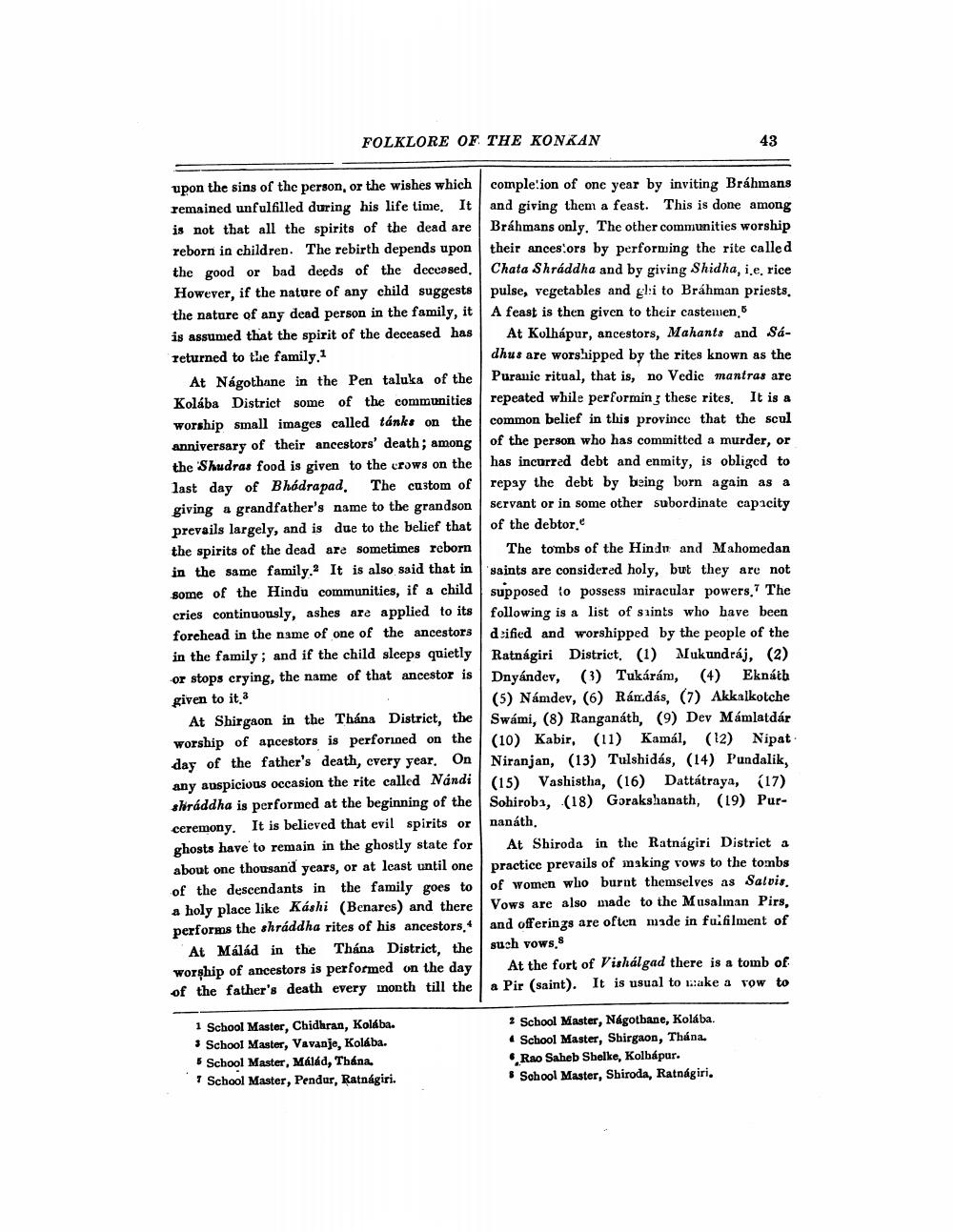________________
FOLKLORE OF THE KONKAN
43
upon the sins of the person, or the wishes which completion of one year by inviting Brahmans remained unfulfilled during his life time. It and giving them a feast. This is done among is not that all the spirits of the dead are Bráhmans only. The other communities worship reborn in children. The rebirth depends upon their ances.ors by performing the rite called the good or bad deeds of the deceased. Chata Shraddha and by giving Shidha, i.e. rice However, if the nature of any child suggests pulse, vegetables and gli to Bráhman priests. the nature of any dead person in the family, it A feast is then given to their castemen, is assumed that the spirit of the deceased has At Kolhápur, ancestors, Mahants and Sáreturned to the family.
dhus are worshipped by the rites known as the At Nágothane in the Pen taluka of the Puranic ritual, that is, no Vedic mantras are Kolába District some of the communities repeated while performing these rites. It is a worship small images called tánks on the common belief in this province that the scul anniversary of their ancestors' death; among of the person who has committed a murder, or the Shudras food is given to the crows on the has incurred debt and enmity, is obliged to last day of Bhódrapad. The custom of repay the debt by being born again as a giving a grandfather's name to the grandson servant or in some other subordinate capacity prevails largely, and is due to the belief that of the debtor. the spirits of the dead are sometimes reborn | The tombs of the Hindu and Mahomedan in the same family. It is also said that in saints are considered holy, but they are not some of the Hindu communities, if a child supposed to possess miracular powers. The cries continuously, ashes are applied to its following is a list of saints who have been forehead in the name of one of the ancestors deified and worshipped by the people of the in the family, and if the child sleeps quietly Ratnagiri District. (1) Mukundráj. (2) or stops crying, the name of that ancestor is Drvándey. (3) Tukárám. (4) Plné given to it.3
(5) Námdev, (6) Rán.dás, (7) Akkalkotche At Shirgaon in the Thána District, the Swami, (8) Ranganath, (9) Dev Mámlatdár worship of ancestors is perforined on the (10) Kabir, (11) Kamál, (12) Nipatday of the father's death, cvery year. On Niranjan, (13) Tulshidás, (14) Pundalik, any auspicious occasion the rite called Nándi (15) Vashistha, (16) Dattatraya, (17) sluráddha is performed at the beginning of the Sohiroba, (18) Gorakshanath, (19) Purceremony. It is believed that evil spirits or nanáth, ghosts have to remain in the ghostly state for At Shiroda in the Ratnagiri District a about one thousand years, or at least until one practice prevails of making vows to the tombs of the descendants in the family goes to of women who burnt themselves as Salvis, a holy place like Káshi (Benares) and there Vows are also made to the Musalman Pirs, performs the shraddha rites of his ancestors and offerings are often made in fulfilment of
At Malád in the Thána District. the such vows 8 worship of ancestors is performed on the day At the fort of Vishalgad there is a tomb of of the father's death every month till the a Pir (saint). It is usual to make a row to
1 School Master, Chidhran, Kolába. * School Master, Vavanje, Kolába. 5 School Master, Malád, Thána * School Master, Pendor, Ratnagiri.
* School Master, Nágothane, Kolába. • School Master, Shirgaon, Thána.
Rao Saheb Shelke, Kolbápur. & School Master, Shiroda, Ratnagiri.




